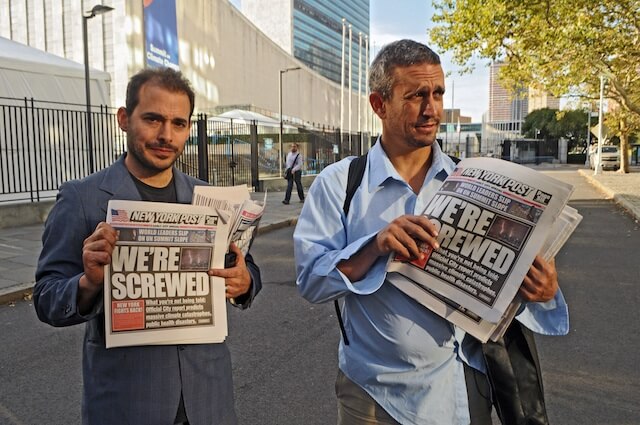It’s not clear what to call the two longtime political activists and pranksters The Yes Men. Since forming in the late ’90s — when they set up a satirical George W. Bush website that pissed off George W. Bush — they’ve gone by Andy Bichlbaum and Mike Bonanno. In reality they’re Jacques Servin and Igor Vamos. Over the last few years they’ve been billed as both. When asked what they prefer, Servin shrugs and says, “It doesn’t matter. Maybe we should make up some new names.” “I’ve got a weird, funny name: Sepp Blatter,” Vamos adds. The shift to a more forthright outlook is in keeping with Servin and Vamos’ third film, “The Yes Men Are Revolting,” a doc that — unlike previous entries “The Yes Men” (2003) and “The Yes Men Fix the World” (2009) — actually includes glimpses of their personal lives. The film, which includes stunts involving global warming and their embrace of Occupy Wall Street, finds them trying to keep up their shtick in the face of middle age and fear that their projects don’t always have the desired impact. Servin, Vamos and their co-director Laura Nix spoke to us about the evolving face of political activism and comedy. Were you two reluctant to get personal?
Igor Vamos: It was a challenge doing the personal stuff. You want to figure out which parts of your life are private and which parts are OK to go public. There are those around you who feel affected in one way or the other. It was very soon after we finished the last film that we started talking about how, if we’re putting together another film, it had to be different. It had to be something where we’re making more of a connection with the viewer and making ourselves more human and more present as characters. Laura Nix: Their films show them as cartoon characters, in a way. They’re superheroes taking over the world. It’s harder to be vulnerable. It’s harder to show having doubt. It’s not funny to have doubt, necessarily. There was this fear that if we included this will the movie be funny enough? But you end up feeling a lot because you get to go on this journey with them, and experience some of the doubts and struggles. They become three-dimensional people, instead of the superheroes they were in other films. There’s been this groundswell of movements that have not been afraid to take to the streets — the kind of engagement you’ve been trying to encourage with your work.
Jacques Servin: It’s an exciting moment because there is this recent history that goes into new movements. The energy of Occupy I think has infused the Black Lives Matter movement, which is much bigger and much more universal. And it will keep going. Social movements that really change things to so over a period of 10 or 12 years. We’re kind of at the beginning still. That isn’t always isn’t easy to process. You want change instantaneously.
Servin: That’s what this film is trying to be about. If things don’t happen immediately they may seem to fail. But they succeed cumulatively. You have to have that attitude that individual actions aren’t really what it’s about. I mean, it is what it’s about, but that’s not all there is. They don’t succeed by themselves; they succeed as part of a movement. Social media has played a major part in encouraging movements, but the pranks you’ve been doing for over 15 years have very much played to its strengths. You want to make an impact, go viral, etc. Servin: We just wrote a piece for The Guardian about that, actually. [Laughs] We say it’s nothing new. Social media is just a tool. It’s just one of the new tools we’ve got.
Comedy is a good way to get people engaged politically. A lot of formerly apolitical or apathetic people have been turned on from watching “The Daily Show.” Vamos: It’s a good on-ramp. People like to share funny things. Getting a foot in the door through humor is really good.
Servin: When people laugh about things they think about them differently. You can even get people who disagree with you to laugh about something. Then they accidentally see what you mean.
How much do you engage with people who really don’t disagree with you — apart from when you’re doing pranks, that is. Servin: During the Bush campaign in 2004 I ended up becoming roommates with a Republican in the East Village. He was a guy who worked for the Homeland Security department. I met him and thought, “Yeah, I gotta live here.” And he thought the same way. We talked about politics every week. We had these raging arguments — I mean, civil, but raging. [Laughs] I learned a lot. Vamos: I remember coming over, and he had guns and he drank a lot of that power builder stuff. It was all guns and weights and what you call “wife beater shirts.” He was into muscles and his weapons. I didn’t think there were people like that in New York City, in Manhattan, in the Lower East Side. It was like, “What was this guy doing?” Servin: He was a spy. [Laughs]
One of your pet issues is global warming. People who deny it aren’t just against working towards it but seem to take it personally. What’s your theory about why that is?
Servin: I love Naomi Klein’s analysis. They’re really viscerally against it. If global warming is real and we have to do something about it, that means basically interrupting free market capitalism the way it is. We can’t have this machine go the way it is and put the breaks on global warming. They can’t go together. Green capitalism kind of doesn’t exist. You need to have a more humane way of dealing with the world. It’s not like global warming is the most important problem. They’re all interconnected. As soon as we do something about that we also do something about inequality and the minimum wage and everything. That’s why I think people are so viscerally opposed to it, because that means all the issues they stand up for — the inequality, the rights of corporations to make as much money as they want without regulations — that all crumbles. Must be sad. Another issue touched on in the film is LGBT rights. Caitlyn Jenner’s Vanity Fair cover was handled almost entirely with warmth, apart from a few jerks. Do you think it’s now more or less a done deal? Servin: They’ve turned around pretty much. I think it’s done. Not totally, but it’s close. Once you have gay marriage what else do you want? [Laughs] It is good that we have gay marriage, but it’s also a little sad that there’s this movement, that’s been part of this larger movement, that is kind of forgotten. It’s great that people can get married. I may get married one day. And it’s a good propaganda tool. If everyone thinks everyone’s equal that’s good for everybody, regardless of sexual orientation. That can extend to being regardless of income level, perhaps. But [the gay rights movement] has so much to teach other movements. ACT UP is still the most inventive recent movement I can think of. They used things in ways that no other movement has done or done as well. There were some ex-ACT UP movement members who were part of Occupy, actually. But the mainstream of the gay movement is no longer political anymore, in the broader sense. This premiered about a year ago. Some things have changed since. What’s vexing you right now? Vamos: Arctic drilling is happening again this summer. There’s things in the movie that have come back like a bad hangover. Shell’s going back to the Arctic, their rigs are in Seattle again — deja vu. Follow Matt Prigge on Twitter @mattprigge
The Yes Men talk global warming, gay rights, living with Republicans

The Orchard


















